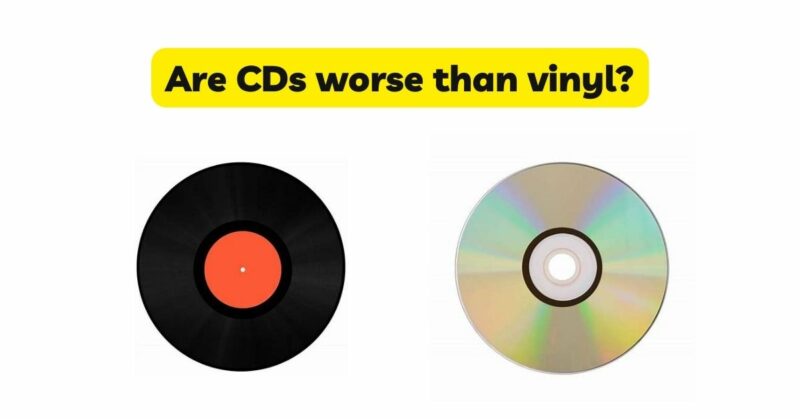The debate surrounding CDs and vinyl records often leads to discussions about which format is superior in terms of sound quality, durability, and overall listening experience. While vinyl records have enjoyed a resurgence in popularity, it is essential to critically examine the factors that contribute to the perception that CDs are worse than vinyl. In this article, we will debunk the myth that CDs are inferior to vinyl by exploring the strengths and advantages of CDs as a format.
- Sound Quality: One common misconception is that vinyl inherently sounds better than CDs. However, the sound quality of a format is influenced by various factors, including the mastering process, production techniques, and playback equipment. CDs offer high-quality sound reproduction, with a wide frequency response and a low noise floor. They provide a clean and accurate representation of the original recording without the inherent imperfections and limitations of analog formats. With advancements in digital audio technology, CDs can deliver a dynamic and faithful sound reproduction that rivals vinyl records.
- Durability and Longevity: CDs are known for their physical durability. Unlike vinyl records, which are susceptible to scratches, warping, and damage from mishandling, CDs are made of a sturdy polycarbonate material that resists wear and tear. CDs can withstand repeated use, making them a reliable and long-lasting format. Additionally, CDs do not degrade over time if properly handled and stored. The data stored on a CD remains intact indefinitely, allowing for consistent playback quality even after years of use.
- Convenience and Portability: One of the key advantages of CDs over vinyl is their convenience and portability. CDs are compact and lightweight, making them easy to carry and transport. They can be played on a wide range of devices, including CD players, computers, and portable music players. This portability allows listeners to enjoy their music collection wherever they go, making CDs a practical choice for those who value mobility and flexibility.
- Accessibility and Affordability: CDs offer widespread availability and affordability. They can be found in numerous music stores, both physical and online, and are generally less expensive than vinyl records, especially for new releases and mainstream titles. This accessibility allows collectors to build a diverse music collection without breaking the bank. Additionally, CDs are often included in special editions and box sets, offering extra value and content for collectors.
- Consistency and Reproducibility: One of the advantages of CDs is their consistency and reproducibility in sound quality. Once a CD is manufactured, every copy produced will sound identical to the original master. This uniformity ensures that listeners can enjoy the same high-quality sound across multiple copies, making CDs a reliable medium for music playback. This reproducibility also applies to digital copies of CDs, ensuring that the sound quality remains consistent regardless of the playback device.
- Expanded Storage Capacity: CDs have a significantly higher storage capacity compared to vinyl records. A standard CD can hold up to 80 minutes of audio, allowing for longer albums or compilations to be stored on a single disc. This expanded storage capacity provides convenience for listeners who enjoy continuous playback or want to store a large collection of music in a compact format.
- Flexibility and Multifunctionality: CDs offer versatility and multifunctionality. In addition to audio tracks, CDs can contain bonus content such as music videos, interviews, and multimedia elements. Some CDs include digital copies that can be easily transferred to various devices, enabling seamless integration with modern music consumption habits. This flexibility enhances the overall listening experience and provides additional value for CD collectors.
- Technological Advancements: Since the introduction of CDs in the early 1980s, significant technological advancements have been made in digital audio. These advancements have led to improveddigital-to-analog conversion techniques, higher sampling rates, increased bit depths, and enhanced signal processing algorithms. Modern CD players and audio equipment are designed to deliver exceptional sound quality and maximize the potential of CDs. The continued advancements in digital audio technology ensure that CDs remain a viable and high-quality format for music playback.
Conclusion: Contrary to the perception that CDs are inferior to vinyl records, CDs offer numerous advantages in terms of sound quality, durability, convenience, affordability, and versatility. With advancements in digital audio technology, CDs can deliver accurate and faithful sound reproduction, rivaling the perceived warmth and character of vinyl records. CDs are durable, long-lasting, and resistant to degradation when properly handled and stored. They provide convenience, portability, and accessibility to music enthusiasts, allowing for a diverse and expansive music collection. While vinyl records possess their own unique qualities and appeal, it is important to recognize that preferences for sound quality and format choice are subjective and vary among individuals. The choice between CDs and vinyl ultimately depends on personal preferences, collecting goals, and the desired listening experience. Embracing the strengths of each format can lead to a well-rounded music collection that caters to different preferences and listening environments.


